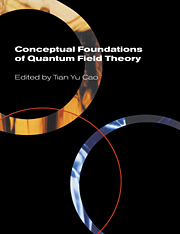Book contents
- Frontmatter
- Contents
- List of contributors
- Preface
- Photographs of the conference
- Introduction: Conceptual issues in quantum field theory
- Part One Philosophers' interest in quantum field theory
- 1 Why are we philosophers interested in quantum field theory?
- 2 Quantum field theory and the philosopher
- Part Two Three approaches to the foundations of quantum field theory
- Part Three
- Part Four Mathematics, statistics and quantum field theory
- Part Five Quantum field theory and space-time
- Part Six
- Part Seven Renormalization group
- Part Eight Non-Abelian gauge theory
- Part Nine The ontology of particles or fields
- Part Ten
- Name index
- Subject index
2 - Quantum field theory and the philosopher
Published online by Cambridge University Press: 22 September 2009
- Frontmatter
- Contents
- List of contributors
- Preface
- Photographs of the conference
- Introduction: Conceptual issues in quantum field theory
- Part One Philosophers' interest in quantum field theory
- 1 Why are we philosophers interested in quantum field theory?
- 2 Quantum field theory and the philosopher
- Part Two Three approaches to the foundations of quantum field theory
- Part Three
- Part Four Mathematics, statistics and quantum field theory
- Part Five Quantum field theory and space-time
- Part Six
- Part Seven Renormalization group
- Part Eight Non-Abelian gauge theory
- Part Nine The ontology of particles or fields
- Part Ten
- Name index
- Subject index
Summary
The topic I want to address principally is what exactly philosophers can be expected to contribute to discussions of the foundations of QFT. This of course is part of the broader problem of the relation between science and philosophy generally. I will begin, then, with some general points before turning to more detailed issues with specific reference to QFT.
Philosophy is a second-order activity reflecting on the concepts, methods and fundamental presuppositions of other disciplines, art, politics, law, science and so on, but also, most importantly, examining reflexively its own arguments and procedures. To put it crudely other disciplines may refer to philosophy as a sort of ‘court of appeal’ to resolve foundational disputes (at a sufficient level of generality). But philosophy has to serve as its own court of appeal, to pull itself up by its own bootstraps so to speak.
To many, science is the paradigmatic example of objective, rational, empirically warranted knowledge. So it is to epistemology, the theory of knowledge, that we must turn to examine the credentials of the scientific enterprise. But the first thing to notice about philosophy as compared with science, and in particular physics, is that there is a striking lack of consensus about what knowledge is and how it can be achieved.
- Type
- Chapter
- Information
- Conceptual Foundations of Quantum Field Theory , pp. 34 - 40Publisher: Cambridge University PressPrint publication year: 1999
- 15
- Cited by



